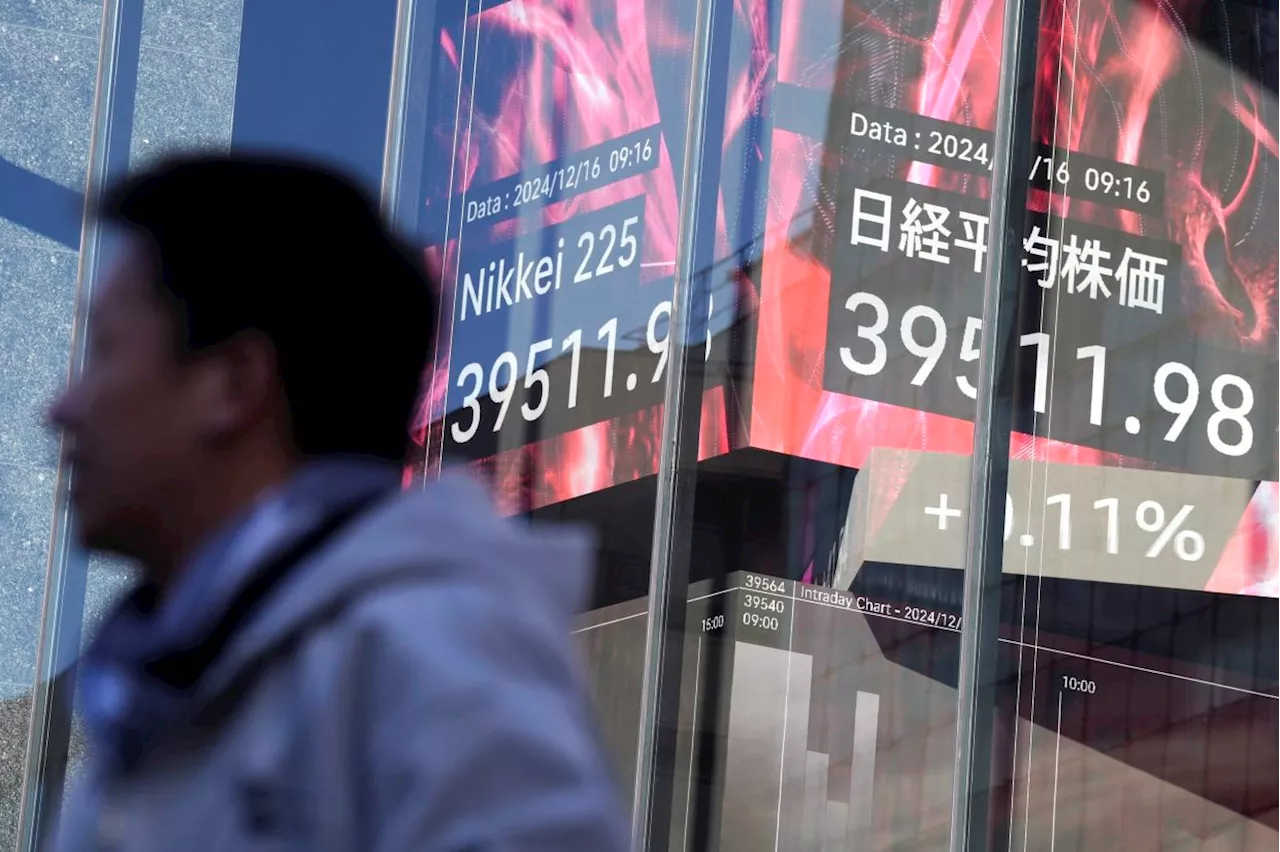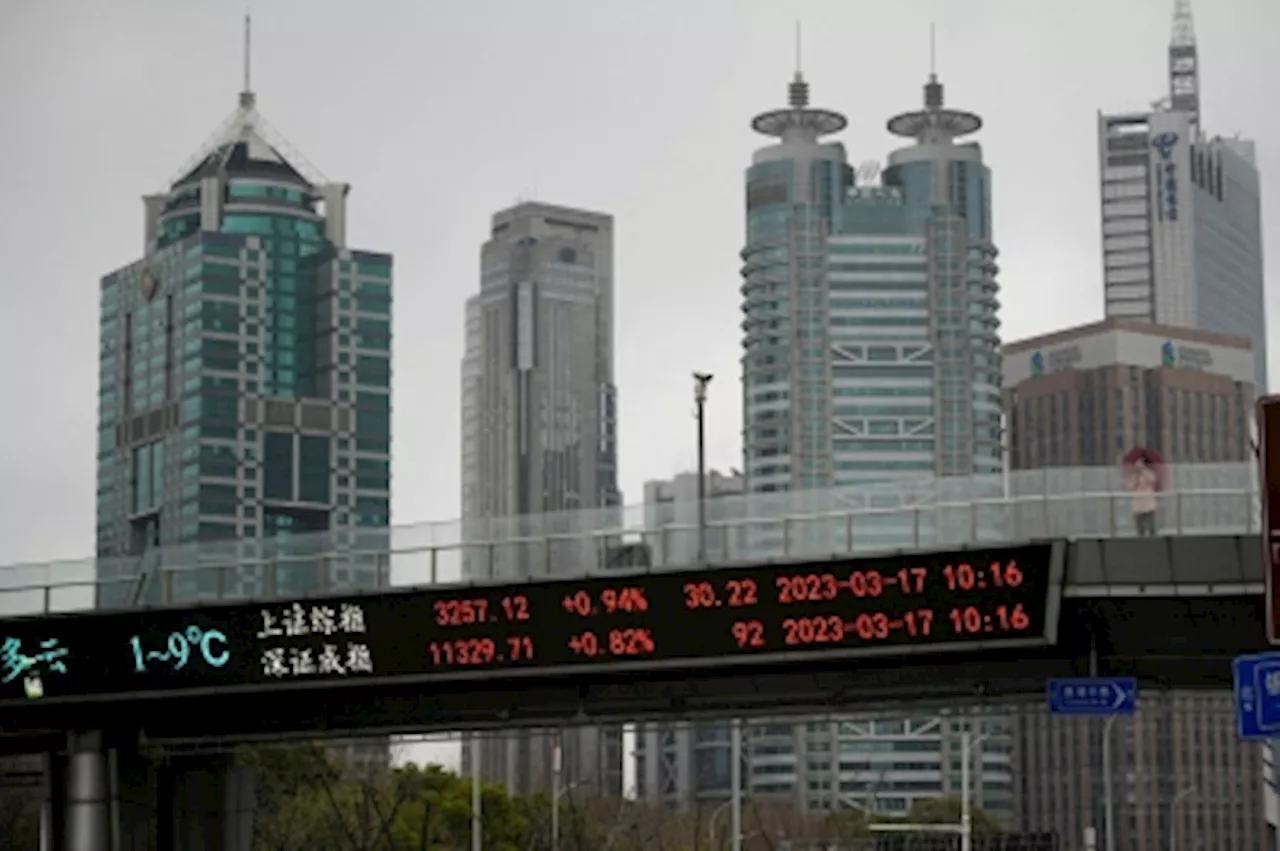Asian markets experienced a sharp decline on Friday, driven by a robust US jobs report that dashed expectations for further interest rate cuts. Oil prices also surged, extending recent gains triggered by sanctions on Russia's energy sector. The equity sell-off mirrored losses on Wall Street, where all three major indexes closed over one percent lower.
Asian markets plunged on Friday following a robust US jobs report that dampened expectations for further interest rate cuts, while oil prices continued their upward trajectory fueled by fresh sanctions on Russia's energy sector . The equity sell-off mirrored significant losses on Wall Street, where all three major indexes closed over one percent lower as the new trading year faltered.
The eagerly anticipated jobs data released on Friday revealed that the US economy added 256,000 jobs in December, exceeding November's revised figure of 212,000 and surpassing forecasts of 150,000-160,000. This positive employment data followed reports indicating an uptick in the crucial US services sector during December, with price components surging to their highest level since January 2024, and job openings reaching a six-month high in November. Hopes that the Federal Reserve would continue its rate-cutting cycle through 2025, having implemented three reductions last year, were dashed in December when the central bank indicated only two reductions over the next 12 months, down from the previously anticipated four. This hawkish shift came as inflation remained stubbornly above the Fed's two percent target, alongside concerns that President-elect Donald Trump's plans to slash taxes, regulations, and immigration could rekindle price pressures. 'Given a resilient labour market, we now think the Fed cutting cycle is over,' stated Bank of America's Aditya Bhave and other economists. 'Inflation is stuck above target: in the December (summary of economic projections), the Fed not only marked up its base case for 2025 significantly, but also indicated that inflation risks were skewed to the upside. Economic activity is robust.' Asian equities declined across the board, with Hong Kong, Taipei, and Manila experiencing losses of over one percent each, while Shanghai, Sydney, Singapore, Seoul, and Jakarta also witnessed significant drops. Tokyo remained closed for a holiday. Oil prices surged, adding to the market unease, with both benchmark contracts climbing approximately two percent, extending Friday's gains of over three percent, following the United States and Britain's announcement of new sanctions against Russia's energy sector, including the oil giant Gazprom Neft. However, analysts anticipate that prices may not escalate dramatically, even amidst speculation that Trump will impose additional sanctions on Iran. 'A significant and perhaps underpriced risk to crude oil prices is the potential for supply to outstrip demand, especially given OPEC+'s intention to reintroduce barrels to the market,' commented Stephen Innes at SPI Asset Management. 'Even if US sanctions curtail Iranian oil production by 1.5 million barrels a day — a scenario similar to that during Trump's previous presidency — this amount could easily be compensated by OPEC+, which is currently holding back 5.8 million barrels a day, or 5.3 percent of the total global production capacity.' He added, however, that certain factors could propel crude prices skyward, including an escalation of the Middle East crisis, a substantial reduction in Russian output or exports, and a strategic reversal by OPEC+ to slash production
ASIAN MARKETS OIL PRICES US JOBS REPORT FEDERAL RESERVE INTEREST RATES RUSSIA ENERGY SECTOR SANCTIONS
Malaysia Latest News, Malaysia Headlines
Similar News:You can also read news stories similar to this one that we have collected from other news sources.
 Asian Stocks Tumble, Currencies Weaken on Fed's Hawkish ShiftEmerging Asian stocks sank to multi-month lows and currencies weakened against a surging dollar on Thursday after the U.S. Federal Reserve signaled a slower pace of rate cuts in the coming year. The Fed's hawkish tilt, despite a widely anticipated rate cut, spurred traders to cut back expectations for further easing and propelled the dollar to a near two-year high. The MSCI index of international emerging markets equities declined as much as 1.6%, while MSCI's emerging markets currency index fell 0.5% to its lowest level in over four months. Several Asian currencies, including the South Korean won, Indian rupee, Malaysian ringgit, and Indonesian rupiah, experienced significant drops against the dollar. Central banks in Indonesia, Thailand, and India took steps to stabilize their respective currencies.
Asian Stocks Tumble, Currencies Weaken on Fed's Hawkish ShiftEmerging Asian stocks sank to multi-month lows and currencies weakened against a surging dollar on Thursday after the U.S. Federal Reserve signaled a slower pace of rate cuts in the coming year. The Fed's hawkish tilt, despite a widely anticipated rate cut, spurred traders to cut back expectations for further easing and propelled the dollar to a near two-year high. The MSCI index of international emerging markets equities declined as much as 1.6%, while MSCI's emerging markets currency index fell 0.5% to its lowest level in over four months. Several Asian currencies, including the South Korean won, Indian rupee, Malaysian ringgit, and Indonesian rupiah, experienced significant drops against the dollar. Central banks in Indonesia, Thailand, and India took steps to stabilize their respective currencies.
Read more »
 China Asks Funds to Limit Stock Sales as Markets TumbleChinese authorities are trying to stabilize markets by asking some large mutual funds to limit stock sales. The move comes amid worries about US tariffs and a sluggish economy.
China Asks Funds to Limit Stock Sales as Markets TumbleChinese authorities are trying to stabilize markets by asking some large mutual funds to limit stock sales. The move comes amid worries about US tariffs and a sluggish economy.
Read more »
 Asian Economies Need to Create Own Consumer Markets, Says Malaysian MinisterLiew Chin Tong, Deputy Investment, Trade and Industry Minister of Malaysia, stresses the importance of Asean nations building their own consumer markets to reduce reliance on the US. He emphasizes this shift amidst global challenges like the pandemic, geopolitical tensions, and financial instability.
Asian Economies Need to Create Own Consumer Markets, Says Malaysian MinisterLiew Chin Tong, Deputy Investment, Trade and Industry Minister of Malaysia, stresses the importance of Asean nations building their own consumer markets to reduce reliance on the US. He emphasizes this shift amidst global challenges like the pandemic, geopolitical tensions, and financial instability.
Read more »
 Asian markets mixed ahead of US Fed news, Nissan soars on merger reportsHONG KONG, Dec 18 — Asian markets swung today ahead of the Federal Reserve’s much-anticipated policy announcement, while shares in Japanese car titan Nissan soared more than 20...
Asian markets mixed ahead of US Fed news, Nissan soars on merger reportsHONG KONG, Dec 18 — Asian markets swung today ahead of the Federal Reserve’s much-anticipated policy announcement, while shares in Japanese car titan Nissan soared more than 20...
Read more »
 Asian markets mixed as Fed gears up for interest rate decisionSalim Fateh Din has been reappointed as the Malaysian Communications and Multimedia Commission (MCMC) chairman for another two years, effective March 1 .
Asian markets mixed as Fed gears up for interest rate decisionSalim Fateh Din has been reappointed as the Malaysian Communications and Multimedia Commission (MCMC) chairman for another two years, effective March 1 .
Read more »
 Asian Stocks Rise Despite Wall Street LossesAsian markets defied a sluggish start to 2025 on Wall Street, with the dollar strengthening and markets reopening after the New Year holiday.
Asian Stocks Rise Despite Wall Street LossesAsian markets defied a sluggish start to 2025 on Wall Street, with the dollar strengthening and markets reopening after the New Year holiday.
Read more »
